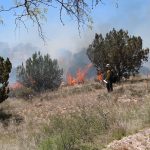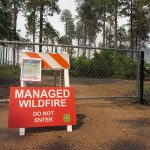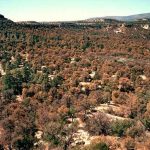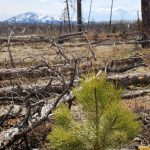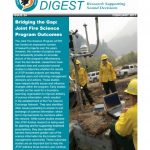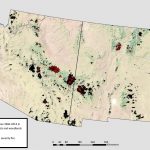Watch recordings of the latest in wildland fire science advancements & other topics
Find recordings of all our webinars on our You Tube Channel @swfirescience.
April 26, 2017: Southwest Fire Season 2016 Overview and 2017 Outlook
Date: Wednesday April 26, 2017 12pm MDT (11am AZ) Presenter: Zander Evans, Forest Stewards Guild and Chuck Maxwell, Predictive Services Meteorologist, Southwest Coordination Center Please join us for a webinar to review last year’s fires and look ahead toward conditions for this…
April 12, 2017: Efficacy of resource objective wildfires for restoring ponderosa pine ecosystems in N. Arizona
Efficacy of resource objective wildfires for restoring ponderosa pine ecosystems in northern Arizona Date: April 12, 2017 11am AZ/12pm MDT Presenter: David Huffman, Ecological Restoration Institute, Northern Arizona University Historical interruption of frequent surface fire regimes and decades of fire exclusion…
March 1, 2017: Fuels treatments and ecological values in piñon-juniper woodlands: Vegetation, birds, and modeled fire behavior
Date: March 1, 2017, 12pm MST Presenter: Jonathan Coop and Pat Magee Mastication and hand-thinning treatments are increasingly utilized by land managers as a means of reducing tree cover for fire hazard mitigation and other habitat objectives in piñon-juniper (P-J) woodlands.…
January 18, 2017: Patterns of conifer regeneration following high severity wildfire in ponderosa pine-dominated forests
Date: January 18, 2017, 12pm MST Presenter: Marin Chambers, Colorado Forest Restoration Institute, CSU The past two decades have witnessed fires of increased severity in southern Rocky Mountain ponderosa pine – dominated forests. Marin will discuss results from an ongoing project that…
November 1, 2016: Is science used to inform fire management and policy decisions?
Date: November 1, 2016 12pm MDT (11am AZ) Presenter: Molly Hunter, University of Arizona This webinar will include recent science findings and a case study. Dr. Molly Hunter will present results from an assessment of outcomes from research projects funded by the…
November 16, 2016: Forest density preferences of homebuyers in the WUI
Date: November 16, 2016 12pm MST Presenter: Evan Hjerpe, Conservation Economics Institute and Yeon-Su Kim, Northern Arizona University In the fire-prone Western U.S., the scale of surrounding forest density can be realized by homebuyers as an amenity for aesthetics and cooling effects,…
October 5, 2016: Developing & maintaining trust in collaborative forest projects
Presenter: Kimberly Coleman, University of Vermont Date: October 5, 2016 This webinar will describe qualitative, case study research that investigated four projects in the Collaborative Forest Landscape Restoration Program (CFLRP) to understand how varying organizational structures impacted collaboration. I selected…
August 24, 2016: Increasing trends in high severity fire in the southwestern USA from 1984-2013
Presenter: Megan Poling, PhD Student, Northern Arizona University In the last three decades nearly 5 million hectares have burned in all vegetation types in the Southwest and the largest fires in documented history have occurred in the past two decades. However,…
August 22, 2016: Meeting the JFSP data availability requirement
Presenter: Laurie Porth and Dave Rugg, U.S. Forest Service Research & Development, Research Data Archive Meeting the JFSP grant requirement for post-research data accessibility requires some planning. This webinar will review the two paths for satisfying the data requirement, discuss in…
May 18, 2016: Finding the Best Available Science on Fire Effects and Fire Regimes in Southwestern and Southern Rocky Mountains Ecosystems
Presenter: Robin Innes, Ecologist Fire Effects Information System (FEIS, www.feis-crs.org/feis/) staff will introduce new two fire regime products-Fire Regime Reports and Fire Regime Syntheses-and demonstrate FEIS’s new search functions to inform fire management planning and decision-making in the Southwest and Southern…
May 18, 2016: Southwest Fire Season: 2015 Overview and 2016 Outlook- May 2016
Presenter: Zander Evans, Forest Guild and Brent Wachter, National Weather Service Please join us for a webinar to review last year’s fires and look ahead toward conditions for this year. Dr. Zander Evans will present an overview of the 12 largest…
April 20, 2016: Simple Steps to Wildland Fire Communication
Presenter: Cathie Schmidlin, Type 1 PIO, retired USFS Region 3 Media Officer This webinar will cover the basic steps of public information when interacting with communities, general public and media. Click here to register for this webinar now! Cathie has been…
March 17, 2016: Persistence and fire regimes of oak shrubfields suggest increasing dominance with climate change
Presenter: Chris Guiterman, University of Arizona PhD Candidate A number of recent studies in the Southwest region have documented abrupt transitions of conifer-dominated forests to shrubfields following high-severity fire. Little is known about the long-term ecosystem dynamics of these stands, including…
January 13, 2016: Effectiveness of Wildfire Mitigation Activities in the Wildland-Urban Interface (WUI)
Date: January 13, 2016Presenter: Zander Evans, Forest Guild Each year wildfires damage homes, businesses, communities, watersheds, and forests on millions of acres across the U.S. However there are effective ways to reduce the impact of wildfire. A new report, Evaluating…
February 17, 2016: Ecology of Smoke
Presenter: Mary Lata, USFS Fire Ecologist The Ecology of Smoke is something that has been considered by very few in the United States, despite extensive and intensive interest and research into frequent fire systems. This presentation will review some of the…
January 20, 2016: Biophysical Settings Review: What it is. How it works. Why it matters
Date: Wednesday January 20, 2016 12pm Mountain Presenter: Randy Swaty, The Nature Conservancy LANDFIRE Team All ecosystems are dynamic, changing due to growth, succession and disturbances. Modeling large landscapes in the United States requires the collective knowledge of experienced and knowledgeable vegetation…
December 16, 2015: Impacts of Thinning and Burning in Spotted Owl Habitat
Presenter: Quentin Hays, Eastern New Mexico University On forested lands throughout the Southwest, Mexican spotted owls (Strix occidentalis lucida) are a driver of management activities, as the current Recovery Plan (USFWS 2012) dictates forest treatment guidelines in designated owl habitat. These guidelines…
June 20, 2012: Fire Regime Condition Class Concepts
Presenter: Steve Barrett & Kathy Schon (NIFTT University of Idaho) Fire Regime Condition Class (FRCC) is an interagency, standardized tool for determining the degree of departure from reference condition vegetation structure and composition and fire regimes. FRCC metrics can help guide…
November 10, 2015: Mixed Conifer Forest Ecology: Emerging Science
This will be a panel presentation followed by a question/answer and discussion, approximately 90 minutes in length Assessing and analyzing mixed conifer spatial patterns of northern Arizona (Kyle Rodman) Effects of tree cutting and fire on understory vegetation in mixed conifer forests…
October 21, 2015: Local Ecological Knowledge and Fire Management: What Does the Public Understand?
Date: Wednesday, October 21, 2015 1pm MDT (12pm AZ) Presenters: John Diaz, North Carolina State University As fire management agencies seek to implement more flexible fire management strategies, local understanding and support for these strategies become increasingly important. One issue associated with…
August 26, 2015: Climate change and fire in the Southwest
Presenter: Larissa Yocom, Northern Arizona University Global climate change will lead to shifts in climate patterns and fire regimes in the Southwest over coming decades. The intent of this webinar is to summarize the current state of scientific knowledge about…
September 2015: Immediate post-wildfire effects on bats in the Southwest
Presenters: Erin Saunders Northern Arizona University and U.S. Forest Service, and Carol Chambers, Northern Arizona University Ponderosa pine forests in the southwestern U.S. have increased in density over the last 100 years which has dramatically increased the size and frequency of…
July 8, 2015: Connecting resilience science with decision-making: Guidelines for the effective development and application of scientific information
Presenter: Melanie Colavito, University of Arizona This webinar describes the results of a study that sought to identify barriers and opportunities to the use of scientific information about resilience for decision-making and on-the-ground management. Data for this study was collected…
May 12, 2015: The Southwest Fire Season: 2014 Overview and 2015 Outlook
Presenter: Zander Evans, Forest Guild and Chuck Maxwell, Predictive Services Please join us for a webinar to review last year’s fires and look ahead toward conditions for this year. Dr. Zander Evans will present an overview of the 12 largest fires…
April 15, 2015: Effects of climate variability and accelerated thinning on watershed-scale runoff in Southwestern ponderosa pine forests
Presenter: Marcos Robles, The Nature Conservancy The recent mortality of up to 20% of forests and woodlands in the southwestern United States, along with declining stream flows and projected future water shortages, heightens the need to understand how management practices…
April 2, 2015: Tamarisk invasion and fire in Southwestern desert ecosystems
Presenter: Gail Drus, St. Francis University Increased wildfire has been observed with the displacement of native cottonwood-willow (Salix and Populus spp.) gallery forests by invasive, non-native tamarisk (Tamarix spp.) in desert riparian zones of North America. Greater post-fire recovery of…
February 25, 2015: Fire and climate history of the western San Juan Mountains, Colorado: Integration of tree-ring and alluvial-sediment methods
Presenter: Erica Bigio, University of Arizona This webinar presents research on the historical fire regimes of the western San Juan Mountains in southwestern Colorado, where the landscape provided a unique opportunity to sample tree-ring and alluvial-sediment records in the same…
January 21, 2015: The Ability of Wildfire to Act as a Fuel Treatment
Presenter: Sean Parks, Aldo Leopold Wilderness Research Institute, Rocky Mountain Research Station, U.S. Forest Service In partnership with the Northern Rockies Fire Science Network, Sean will present the results from a JSFP-funded study that highlights the ability of wildfire to…
December 10, 2014: Working Across Fence Lines: Multi-jurisdictional planning and prescribed fire
Presenter: Eytan Krasilovsky, Forest Guild Fire cuts across administrative boundaries and our restoration work needs to as well. Whether it is multijurisdictional planning or multiagency prescribed burning, working across boundaries presents a unique set of challenges. In this webinar, Eytan…
October 22, 2014: Smoke Forecasting Tools: A Case Study in Air Quality Response
Presenter: Ron Sherron, U.S. Forest Service This webinar was recommended for participants in the “Wildland fire smoke in the air- What does it mean to ME?” workshop in Albuquerque, New Mexico November 6-8, 2014. Watch a recording of this webinar…
September 17, 2014: Fire management in the Gila National Forest and Saguaro National Park
Presenter: Molly Hunter – Northern Arizona University Fire suppression has been the dominant fire management strategy in the West over the last century. However, managers in the Gila National Forest and Saguaro National Park have allowed fire to play a…
August 27, 2014: A panel perspective on regeneration in Southwest pine forests after high severity wildfire
Panelists: Pete Fulé – Northern Arizona University, Collin Haffey – USGS Jemez Field Station, José Iniguez and Suzanne Owen – USFS Rocky Mountain Research Station, Jim Youtz – USFS Southwestern Region, Joy Mast – Carthage College The Southwest Fire Science…
June 11, 2014: People, fire, and insects: Three centuries of disturbance interactions along an ecological gradient of the Pinaleño Mountains, Arizona
Presenter: Kit O’Connor, University of Arizona In the Pinaleño Mountains of Southeast Arizona, a series of high-severity insect outbreaks and fires in recent decades appear to be unprecedented in the historical record. These disturbances raise concerns about forest resilience and…
May 29, 2014: A resilience ecology framework for southwestern forests: Ecosystem shifts, landscape disturbance and climate change
Presenter: Donald Falk, University of Arizona In this webinar, Dr. Don Falk will review the basic concepts of ecological resilience as it applies to fire-adapted ecosystems in the Southwest. He will discussion how these concepts apply to the challenge of…
April 16, 2014: The southwest fire season: 2013 overview and 2014 outlook
Presenters: Zander Evans (Forest Guild) and Chuck Maxwell (Predictive Services) This webinar provided an overview of the eight largest fires in the Southwest during 2013 based on the recent report from ERI and SWFSC. The webinar included summaries of forest…
March 12, 2014: Identifying Priority Treatment Areas Across the Apache-Sitgreaves National Forests
Presenter: Joe Crouse, Ecological Restoration Institute To address concerns regarding how to prioritize treatments across the forests, the Ecological Restoration Institute received funding from the USDA Forest Service to identify priority treatment areas across the Apache-Sitgreaves National Forests. In addition,…
February 13, 2014: Restoring Composition and Structure in Southwestern Frequent-Fire Forests: A science-based framework for improving ecosystem resiliency
Presenters: Richard Reynolds, Andrew Sánchez Meador, James Youtz, Tessa Nicolet, Megan Matonis, Patrick Jackson, Donald DeLorenzo, Andrew Graves (based on RMRS-GTR-310) Originally intended as pre-work for “Fostering resilience in Southwestern ecosystems: A problem solving workshop” on February 13, 2014. Watch…
February 11, 2014: What is Climate Change? How will our changing climate impact seasonal weather conditions across the Southwest?
Presenters: Darren McCollum and Robert Bohlin, National Weather Service meteorologists Originally presented February 11, 2014 This webinar was originally intended as pre-work for “Fostering resilience in Southwestern ecosystems: A problem solving workshop,” Read a pdf of their presentation. Watch the…
January 15, 2014: Black Lake Prescribed Burn: Lessons Learned in Building Capacity for Prescribed Fire
Eytan Krasilovsky will share challenges and lessons learned surrounding the Forest Guild’s recent Black Lake Training Exchange. Forest Guild and the New Mexico State Land Office, with support from the Nature Conservancy’s Fire Learning Network, convened a grant funded training…
December 12, 2013: Cooperative Burning and Training Exchanges
Jeremy Bailey, a career firefighter and prescribed fire burn boss, will discuss the Fire Learning Network’s Training Exchange program and how it is being used to train numerous local workforces to advance burning across all lands. In the past seven…
November 25, 2013: The Role of Fire in Shortgrass Rangelands
Presenter: David Augustine, USDA-ARS Landscape Ecologist In this webinar, we will discuss research on the role and use of prescribed fire in the western Great Plains, focusing on studies conducted in the shortgrass steppe of Colorado over the past decade.…
November 12, 2013: Fire Legacy’s role in current and future fire management in the Southwestern U.S.
Presenter: Tessa Nicolet, USFS Region 3 Fire Ecologist The southwestern United States encompasses many ecosystems with intimate and inseparable relationships with fire. It is well accepted that fire plays an integral role in the ecology and maintenance of many forest…
September 25, 2013: How will climate change and treatments affect future forests? Testing alternatives with the Climate-FVS model
Presenter: Pete Fulè, Professor, Northern Arizona University Under current conditions, large, severe wildfires are a fact of life in southwestern ponderosa pine forests. What will burned systems look like over the coming decades under warming climate? Do management treatments make…
August 21, 2013: Effects of fuel treatments on wildfire severity
Presenters: Charlotte Reemts, an Ecologist for the Nature Conservancy and Helen Poulos, Wesleyan University Charlotte and Helen teamed up to present this webinar that connected science and management of fire in the Davis Mountains of west Texas. Three wildfires burned through…
June 19, 2013: Effects of Wildland Fire on Lowland Leopard Frogs and their Habitat at Saguaro National Park
Presenter: Don Swann, Saguaro National Park Don Swann is a biologist at Saguaro National Park, Tucson, Arizona, where he has worked for more than 20 years. He has an MS in Wildlife and Fisheries from University of Arizona. Don’s projects…
May 15, 2013: The Structure of Fire Size Distributions: A Broad View of Interacting Gradients in Wilderness Management, Spatial Climate, and Topography in Three Western Regions
Presenter: Sandra Haire, Haire Laboratory for Landscape Ecology Determining the effects of land management on fire regime characteristics is complicated by the interaction of several factors that vary in space and time. First, fire size and frequency are linked to…
April 25, 2013: Impacts of fire hazard assessment and fuel reduction priorities on mega-fire outcomes: A hypothetical test using the Wallow Fire in Arizona
Presenter: Amy Waltz, Program Director of Science Delivery, Ecological Restoration Institute Uncharacteristically large and severe wildfires, or mega-fires, are occurring with increasing frequency over the last decades in the western United States. The 2011 Wallow Fire, a 538,049-acre (217,740-hectare) fire…
March 27, 2013: The Fire Season Outlook for 2013 and How It’s Built
Presenter: Chuck Maxwell, Fire Meteorologist, Southwest Coordination Center, Predictive Services Chuck Maxwell will discuss how Predictive Services develops seasonal fire potential predictions and what the outlook is this year for the Southwest. Join this webinar to get an inside view…
February 19, 2013: Implementing the Mexican spotted owl revised recovery plan: Conducting fire management in owl habitat
Presenters: Bill Block (USFS RMRS) and Shaula Hedwall (USFWS) The Mexican Spotted Owl Recovery Plan, First Revision, was released on December 17, 2012. The Recovery Team used the best available science to delineate actions we think are required to recover…
January 16, 2013: Temperature as a driver of regional forest drought stress and tree mortality
Presenter: Park Williams, Los Alamos National Laboratory Dr. Williams will discuss his recent work to derive a forest drought-stress index (FDSI) for the southwestern United States using a comprehensive tree-ring data set representing AD 1000–2007. This FDSI is linked to…
December 9, 2012: Synthesis of Knowledge of Extreme Fire Behavior for Fire Managers
Presenter: Paul Werth Extreme fire behavior indicates a level of fire behavior characteristics that ordinarily precludes methods of direct control action. One or more of the following is usually involved: high rate of spread, prolific crowning/spotting, presence of fire whirls,…
November 14, 2012: Wildland Fire in Ecosystems: Effects of Fire on Cultural Resources
Presenter: Kevin Ryan This webinar provided an introduction to the new edition of the Rainbow series that provides fire and land management professionals and policy makers with a greater understanding of the value of cultural resource protection and the methods…
October 17, 2012: Economics of Ecological Restoration and Hazardous Fuel Reduction Treatments
Presenter: Yeon-Su Kim (Northern Arizona University) and Diane Vosick (Ecological Restoration Institute) What are the economic values of landscape-level ecological restoration and hazardous fuel treatments? The Ecological Restoration Institute at Northern Arizona University (ERI) assembled a team of wildland fire economists…
September 19, 2012: Social Network Analysis
Presenter: Vita Wright (Northern Rockies Fire Science Network) Recent science communication studies of the federal fire management community suggest managers access research via informal information networks, and that these networks vary by both agency and position. We used a phone…
June 22, 2011: Fire history and age structure patterns at landscape scales
Presenter: Jose Iniguez (USFS RMRS) Top-down regional climate patterns result in high spatial fire synchrony among Southwest forests. At landscape scales, however bottom-up (topography) patterns are also important in determining fire history and tree age structure variability. The distinct fire…
May 16, 2012: Wildland Fire Assessment Tool
Presenter: Eva Strand & Josh Hyde (NIFTT University of Idaho) WFAT provides an interface between ArcMap, FlamMap 5, and the First Order Fire Effects Model (FOFEM), combining their strengths into a spatial fire behavior and fire effects analysis tool in…
February 15, 2011: Effectiveness of post-fire seeding and herbicide treatments to battle cheatgrass in Zion National Park
Presenter: Andrea Thode (Northern Arizona University) Fine fuels from non-native, annual brome grasses have overcome native plants across much of Zion Canyon in Zion National Park. This invasion threatens the single road that provides access into—and escape from—the canyon, creating…
December 14, 2011: Carbon and water balances of southwestern ponderosa pine forests
In this webinar Dr. Thomas Kolb summarized the key findings of a six-year study of impacts of intense fire and fuel-reduction thinning on the carbon and water balances of ponderosa pine forests in Arizona. The results should be of interest…
October 19, 2011: Fuel Treatment Effectiveness on the Wallow Fire
Presenters: Jim Pitts and Judy Palmer (USFS) A small team was assembled to work with the Apache-Sitgreave National Forest and local partners to assess the effects of the fuel treatments and compile a report with the findings. The report “How…
March 18, 2012: Fire Regime Condition Class Mapping Tool
Presenters: Steve Barrett & Jeff Jones (NIFTT University of Idaho) The FRCC Mapping Tool quantifies the departure of vegetation conditions and fire regimes from a set of reference conditions representing the historical range of variation. The tool, which operates from…
March 2010: Ecological Impact of Mastication
Mike Battaglia (USFS RMRS) presented results from the Joint Fire Science Project on the Ecological Impact of Mastication. Mike reported on the impact of mastication on the chemical and physical conditions of the forest floor, vegetation regrowth, and fuel development.…
July 28, 2010: A Synthesis of the Science on Forests and Carbon for U.S. Forests
Dr. Mike Ryan, USDA Forest Service Research Forest Ecologist, presented a scientific synthesis of the forest carbon cycle. The synthesis covers the entire US, but Dr. Ryan focused on the western US for this webinar. Forests play a key role…
April 18, 2012: First Order Fire Effects Model (FOFEM)
Presenter: Duncan Lutes (RMRS Fire Modeling Institute, Missoula, MT) FOFEM is a computer program for predicting first order fire effects including tree mortality, fuel consumption, smoke production, and soil heating caused by prescribed fire or wildfire. In this webinar you…
March 21, 2012: LANDFIRE Total Fuel Change Tool
Presenters: Tobin Smail & Charley Martin, (US Geological Survey). The LANDFIRE Total Fuel Change Tool (LFTFC) allows users to edit LANDFIRE fuels attributes and associated layers directly with an ArcMap Toolbar. This webinar provides an overview of LFTFC’s capabilities to…
February 15, 2012: LANDFIRE Data Access Tool
Presenters: Chris Toney (US Forest Service, RMRS/LANDFIRE Project) Jeff Jones (RMRS Wildland Fire Management RD&A, Whitefish, MT) The LANDFIRE Data Access Tool (LFDAT) allows users to download LANDFIRE layers from the data distribution site directly into ArcMap. The download extent is…
January 18, 2012: Hydrologic Impacts of High Severity Wildfire: Learning from the Past and Preparing for the Future
Presenter: Dan Neary (USFS RMRS) Fires are increasing in size, frequency, and severity. Simultaneously, development continues in the wildland-urban interface and the number of people living in or visiting forest areas is growing. Understanding the post-fire hydrologic response of watersheds…
May 18, 2011: Fuels Treatment Practices for Mixed Conifer Forests in the Southwest
Presenter: Alexander Evans (Forest Guild) The webinar covered the guide’s definition of mixed conifer, past land use and management activities, fire regimes and historic conditions, and impact of altered fire regimes in mixed conifer forests of the southwest. Since Euro-American…
April 20, 2011: Southwest Climate Change Initiative
Marcos Robles of the The Nature Conservancy presented information from the Southwest Climate Change Initiative. The Initiative is a collaborative effort started by The Nature Conservancy in 2008 to provide climate science information to natural resource managers in Arizona, New…
June 7, 2010: Post-wildfire Seeding: Effectiveness, Trends, Manager Perceptions in Forests across the West
Dr. Pete Fule presented results from the Joint Fire Science Program (JFSP) project synthesizing existing information on post-wildfire seeding (JFSP ID 08-2-1-11). The webinar covered key findings from an evidence-based systematic review conducted to examine the effectiveness and effects of…
